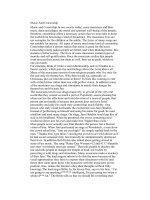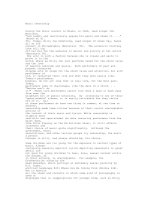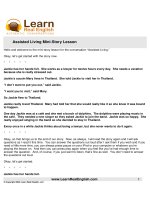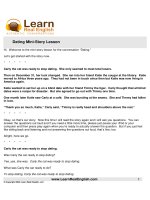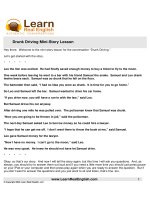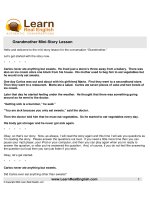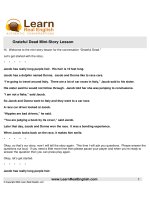ms censorship
Bạn đang xem bản rút gọn của tài liệu. Xem và tải ngay bản đầy đủ của tài liệu tại đây (67.35 KB, 2 trang )
Effortless English
Cyber: adj. related to computers or
machines; relating to the internet
Amnesty: n. pardon, forgiveness
authorities: n. government people
controversial: adj. causing argu-
ment, at issue
blog: n. web log, internet diary or
journal
censorship: n. banning (of informa-
tion), preventing information from
being published
servers: n. big computers that host
software, accounts, etc.
censored: v. banned, deleted
globally: adj. world-wide, all over
the world.
criticism: n. disapproval
implemented: v. used, done
to ensure: v. to promise, to guaran-
tee
legal: adj. related to the law,
access: n. entry, admission
filters: v. separate, screen
politically sensitive terms: n. words
that make the government angry
displaying: v. showing
AI: n. Amnesty International
produced: v. created, made
Falun Gong: n. a spiritual (reli-
gious) group- that is often attacked
by the Chinese government
massacre: n. killing (of many inno-
cent, peaceful, or weak people)
admitted: v. confessed, agreed
dir
ections:
n. orders, commands
r
estricting:
v
. limiting, stopping
terms: n. words (or phrases), names
asser
ts:
v
. says, insists
at odds with: idiom. does not agree
with, goes against
launched: v. started, began
blocked: v
. stopped, prevented
prohibited: v. denied, forbidden,
banned
pr
ofanity:
n. bad language, obsceni
-
ty
Publish Date: February 2, 2007
All Sound (Audio) Archives Available At:
From Amnesty International
In December 2005 Microsoft cooperated with Chinese authorities to shut
down the
controversial blog of Zhao Jing (Michael Anti), a Beijing-based
researcher for the New York Times, and an active critic of censorship in
China.
The blog, which was hosted on
servers located in the United States, was
removed and was therefore
censored not only in China but globally.
Reacting to criticism, Microsoft claims to have implemented a new set of
standards to ensure that they will only remove blogs when they receive for-
mal
legal notice from the Chinese government and that access will only be
denied to users in China.
Microsoft’s search engine MSN China
filters the results of searches for
politically sensitive terms, displaying a message in Chinese which states
‘Certain content was removed from the results of this search’. Searches
undertaken in June 2006 by
AI produced this message for the words ‘Falun
Gong’, ‘Tibet Independence’ and ‘June 4’ (the date of the Tiananmen Square
massacre).
Furthermore, Microsoft has
admitted that it responds to directions from the
Chinese government by
restricting users of MSN Spaces from using certain
terms in their account name, space name, space sub-title or in photo cap-
tions. At the same time the company
asserts that MSN Spaces do not filter
blog content in any way. Amnesty International considers this claim to be at
odds with the facts.
When Microsoft
launched MSN Spaces in China in June 2005, attempts to
create blogs with words including ‘democracy’, ‘human rights’ and ‘freedom
of expression’ were
blocked, producing the following error message (in
Chinese): ‘You must enter a title for your space. The title must not contain
prohibited language, such as profanity. Please type a different title.’ Tests
by AI carried out in 2006 demonstrated continued blocking of certain terms
Microsoft’s Cyber Censorship
www.effortlessenglish.com
including ‘Tiananmen incident’ in the title of blogs.
As a result of such actions, Microsoft users in China are denied the ability to
access
the full range of information available internationally on human
rights topics, including websites and web pages of Amnesty International and
other human rights organizations.
Learn More:
Amnesty International
/>Human Rights
Watch (Asia)
/>incident: n. happening, event
the full range of: n. all of, every
www.effortlessenglish.com

